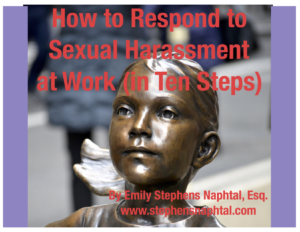New NY Sexual Harassment Training Requirements
In 2018, both New York State and New York City passed laws requiring employers to offer annual sexual harassment training to their employees and contractors. New York State’s new training requirement took effect on October 9, 2018 which makes October 9, 2019 the deadline for employers to train their employees. New York City’s law will go into effect on April 1, 2019 and require training by the end of 2019.
Now is the time to schedule sexual harassment trainings but hiring an online company to just recite the minimum requirements or answer a few questions will not produce the best outcomes. In addition to being illegal, sexual harassment hurts people and hurts companies. Sexual harassment stories do not need to end as tragedies. With the right training, employees and companies can alter their behaviors at critical early junctures.
Minimum Legal Training Requirements
New York State Sexual Harassment Training Requirements
Every employer in New York State is required to provide employees with sexual harassment prevention training on an annual basis starting on October 9, 2018. Employers must train exempt employees, non-exempt employees, part-time workers, seasonal workers, and temporary workers. The training must meet or exceed the following minimum standards.
First, the training must be interactive! This means that employees must be able to ask questions about the material. If an employer simply shows a video or provides a book to read about sexual harassment, that does not meet the requirement.
Next, the training must include (1) an explanation of sexual harassment consistent with guidance issued by the Department of Labor in consultation with the Division of Human Rights, (2) examples of conduct that would constitute unlawful sexual harassment, (3) discussion of the additional responsibilities of supervisors with regards to sexual harassment, (4) information about federal and state sexual harassment laws and their remedies for victims of sexual harassment, and (5) reference to all available forums where employees can adjudicate their complaints.
NYC Sexual Harassment Training Requirements
In addition to their New York State requirements detailed above, companies with NYC employees must comply with a new NYC law as well. Local Law 96 of 2018 takes effect on April 1, 2019 and applies to employers with 15 or more employees.
Above and beyond the state law the City law requires that sexual harassment training include: (1) an explanation of sexual harassment as a form of unlawful discrimination under local law; (2) any internal complaint process available to employees through their employer to address sexual harassment claims; (3) the complaint process available through the New York City Commission on Human Rights, the New York State Division of Human Rights and the United States Equal Employment Opportunity Commission, including contact information; (4) the prohibition of retaliation including examples; (5) information concerning bystander intervention, including but not limited to any resources that explain how to engage in bystander intervention; and (6) managerial employees’ specific duties to prevent and address sexual harassment and retaliation.
Furthermore, the City law requires employers to keep a record of all trainings, including signed employee acknowledgements of them.
Don’t Settle for the Minimum
Meeting New York State and City’s minimum sexual harassment training requirements is critical and a good start towards preventing sexual harassment. But to achieve the best results, employers should take training seriously and provide a useful and engaging training. Some training best practices include:
Live, in-person, training with an attorney who practices employment law and understands the nuances of the New York State and City sexual harassment laws
An interactive training can be much more useful if the person answering questions understands the material from working with it in their legal practice. A training will not be as effective if employees can only answer a few multiple choice questions at the end of an online program, or if someone without an intimate understanding of the law conducts the training.
A trainer with a track record of working to eliminate workplace discrimination
Employees should leave the training feeling that their employer truly takes sexual harassment prevention seriously and seeks to provide a safe and fair workplace. If employees feel that the training amounts to little more than an employer’s attempt to shield itself from liability, the training will not effectively prevent sexual harassment.
Material that helps trainees explore different perspectives and roles
Many people feel afraid of sexual harassment and sexual harassment training. Perhaps they fear being sexually harassed and not taken seriously when they come forward. Perhaps they fear crossing a line they did not know existed and then being penalized for it. Still others feel that sexual harassment has nothing to do with them. An effective training can speak to all of these people, help them explore a variety of roles in the sexual harassment narrative, enforce communication skills, and emphasize team problem solving. Everyone has a role to play in preventing sexual harassment.


